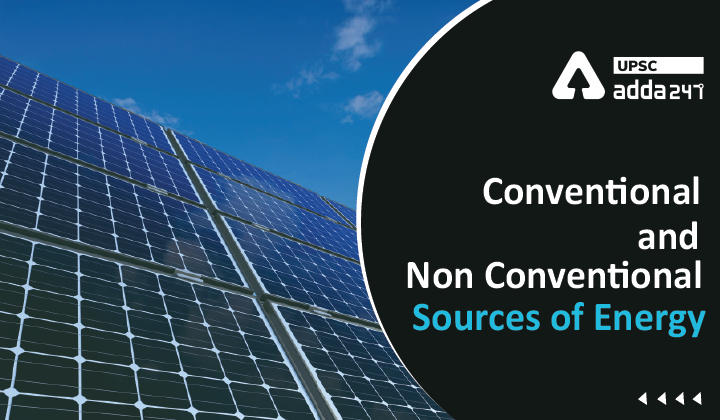Table of Contents
Conventional and Non Conventional Sources of Energy
Different sources of energy are majorly categorised into two sources:
- Conventional sources of energy
- Non-conventional sources of energy
Conventional sources of energy
- Conventional sources of energy are the natural sources of energy available for a limited time period.
- These sources are the non-renewable sources of energy and they get depleted with time.
- They are usually obtained from decaying material which was formed over millions of years ago.
- Examples of conventional sources of energy: coal, natural gas, petroleum etc.
- Conventional sources have cause immense environmental damage and has significantly contributed to global warming.
Different types of conventional sources of energy
Coal
- Coal is one of the most important sources of conventional energy.
- Coal is the most abundant fossil fuel found in India and it has been the main source of India’s energy supply for many years.
- Since the advent of industrialization coal has been most common source of energy.
- There are around 150000 million tonnes of coal deposits in India. Out of which, deposits are mainly in the states of Odisha, Bihar, Jharkhand, Madhya Pradesh, and West Bengal.
- India is the fourth-largest coal producing nation in the world.
Natural gas
- It is an important source of energy in India.
- Natural gas consists about 95% Methane and rest ethane and propane.
- It occurs deep under the crust of the earth either alone or a long with oil above the petroleum deposits.
- It is available in Tripura, Jaisalmer, off-shore areas of Bombay High and in the Krishna – Godavari delta.
- It is used both as a domestic and industrial fuel.
Petroleum products
- It is an important source of energy in India.
- It is used in automobiles, trains, aircraft, and ships and other transportation vehicle.
- The key oil-producing states in India are Mumbai, Assam, and Gujarat.
- Some of the crude oil producing locations in our country are:
- Ankleshwar and Kalol in Gujarat
- Rudrasagar and Lakwa in Assam; and
- Bombay high (off-shore area).
Non-conventional sources of energy
- The sources of energy which are being produced continuously in nature and are in exhaustible are called renewable sources of energy (or) non-conventional energy.
- These sources of energy do not cause environmental pollution and are, therefore, environmental-friendly sources of energy.
- Examples of non-conventional sources of energy: tidal energy, wind energy, hydel energy, solar energy, and geothermal energy.
We will discuss the different types of non conventional sources of energy in the next article.
Read UPSC favourite topics





 TSPSC Group 1 Question Paper 2024, Downl...
TSPSC Group 1 Question Paper 2024, Downl...
 TSPSC Group 1 Answer key 2024 Out, Downl...
TSPSC Group 1 Answer key 2024 Out, Downl...
 UPSC Prelims 2024 Question Paper, Downlo...
UPSC Prelims 2024 Question Paper, Downlo...




